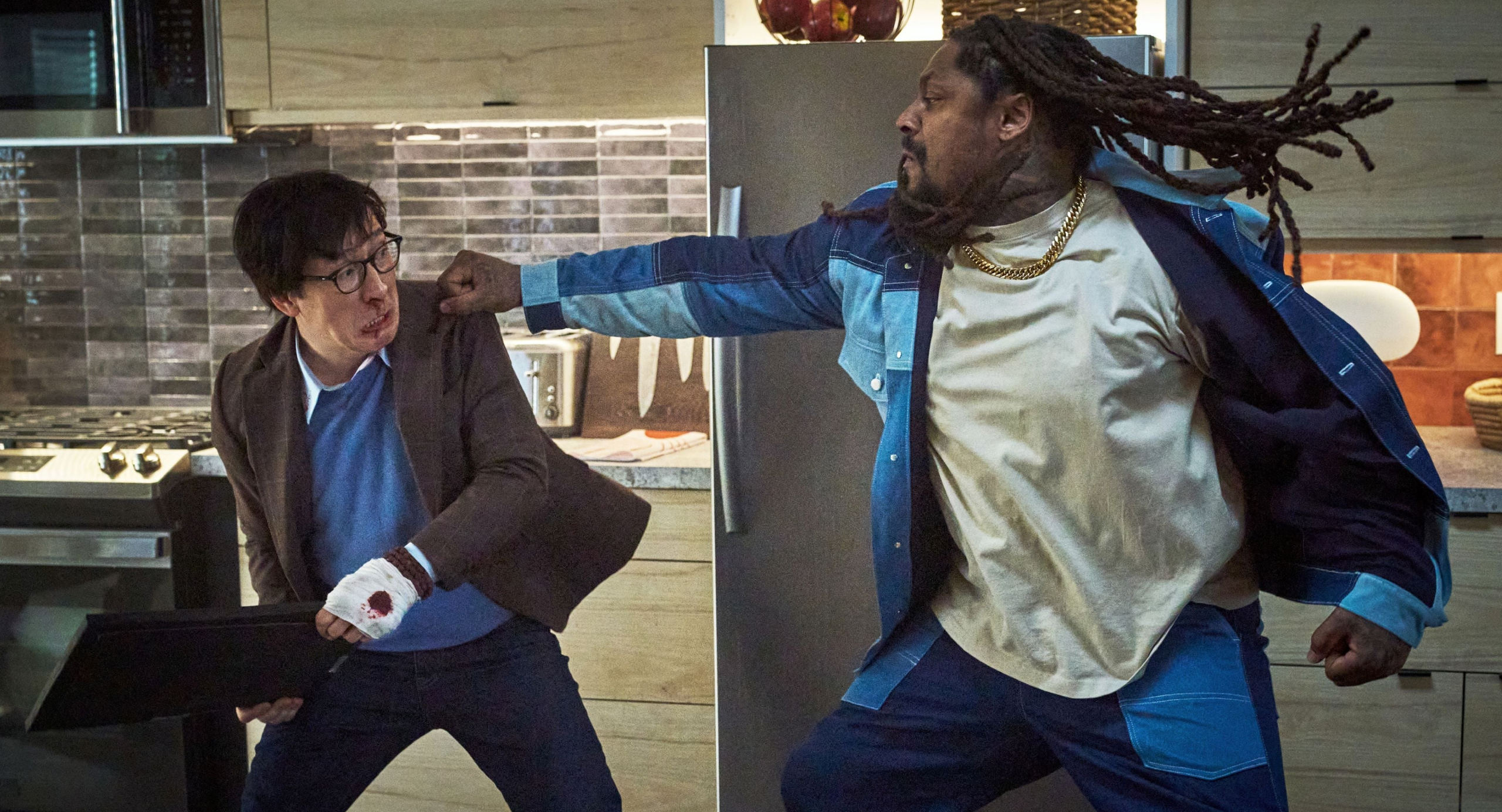Love Hurts – Film Review
Published February 7, 2025

Jonathan Eusebio’s Love Hurts marks his directorial debut with an action-comedy that aims to balance high-octane fight sequences with romantic and comedic elements. Starring Ke Huy Quan as a former hitman-turned-realtor, the film boasts a strong ensemble cast, including Ariana DeBose, Daniel Wu, and Mustafa Shakir. While Love Hurts attempts to deliver a fresh take on the assassin redemption arc, it ultimately struggles with tonal inconsistencies and underdeveloped character dynamics, resulting in a film that feels more chaotic than cohesive.
At its core, Love Hurts presents a compelling setup: Marvin Gable (Ke Huy Quan), a reformed assassin now thriving as a real estate agent, is pulled back into his violent past when his estranged brother, Alvin “Knuckles” Gable (Daniel Wu), sends killers after him. The film leans into a comedic and self-aware tone, using the absurdity of Marvin’s double life to drive the humor. However, while the premise is promising, the execution often feels disjointed, with comedic beats clashing against moments of brutal action and a romance that lacks emotional depth.
Eusebio, a veteran stunt coordinator known for his work on John Wick, ensures that Love Hurts excels in its action choreography. The fight sequences are fluid, well-paced, and inventive, making excellent use of practical stunt work. The standout set piece—a real estate open house that turns into an all-out brawl—is particularly engaging. However, the film’s action-heavy nature sometimes overpowers the narrative, leaving character development and emotional stakes underexplored.
Ke Huy Quan once again proves his versatility, bringing charm and physical prowess to the role of Marvin. His comedic timing and expressive acting make him an engaging lead, and he handles the film’s demanding fight choreography with ease. However, while Quan’s performance is commendable, the film does not fully explore Marvin’s internal conflict. His transition from mild-mannered realtor to lethal fighter is executed with efficiency but lacks the depth needed to make his journey emotionally resonant.
Ariana DeBose, playing Marvin’s former lover Rose, has moments of charisma but is ultimately given too little to work with. Her motivations are clear—seeking revenge and justice against Knuckles—but her relationship with Marvin never quite develops beyond surface-level exchanges. Their romantic chemistry feels undercooked, making the film’s emotional climax less impactful than intended.
Daniel Wu’s portrayal of the ruthless Knuckles is solid, though his character falls into familiar villainous tropes. He is menacing but lacks a distinct personality beyond his status as Marvin’s vengeful brother. Mustafa Shakir, playing the poetic assassin Raven, provides some of the film’s more eccentric humor, but his subplot involving Marvin’s assistant Ashley (Lio Tipton) feels like a tonal mismatch, undercutting the tension rather than complementing it.
The film’s humor is a mixed bag. While some moments of dry wit and absurdist comedy land well, others feel forced or out of place. The running gag involving Marvin’s real estate duties colliding with his assassin past starts strong but quickly loses steam. The romance between Ashley and Raven, while meant to be a quirky subplot, feels more like a distraction, and some of the film’s slapstick moments clash awkwardly with its darker action elements.
Rhys Darby, playing Marvin’s boss Cliff Cussick, provides some amusing moments, but his character’s arc takes an abrupt turn that feels more jarring than impactful. Similarly, Marshawn Lynch and André Eriksen, playing minor antagonists, have their moments of comedic menace, but their presence ultimately does little to elevate the stakes.
Where Love Hurts falters in narrative cohesion, it shines in its fight sequences. Eusebio’s expertise in stunt coordination is evident in the film’s hand-to-hand combat, gunplay, and chase scenes. The choreography is dynamic, making use of creative settings, from a high-rise office to a nightclub showdown. Marvin’s fighting style, blending improvised weapons and martial arts, keeps the action engaging, and Quan’s agility makes these sequences particularly enjoyable.
Despite the excellent fight scenes, the action does not always serve the story. The film struggles to balance its comedic tone with the violence, making it difficult to gauge how seriously it wants the audience to take its stakes. The final confrontation, while visually striking, lacks the emotional weight it should have due to underdeveloped relationships between the main characters.
While Love Hurts attempts to inject heart into its story, it falls short of making its character arcs feel meaningful. Marvin’s journey of self-acceptance—embracing both his past as a killer and his present as a man seeking redemption—is an interesting idea that remains underexplored. His romance with Rose, intended to be the emotional anchor of the film, is treated more as a plot device than a compelling love story.
Knuckles’ vendetta against Marvin, despite being the central conflict, is not given enough depth. Their final showdown is thrilling in terms of action, but their dynamic lacks the complexity needed to make their confrontation emotionally satisfying.
Love Hurts is an ambitious attempt at blending action, comedy, and romance, but it never quite finds the right balance. The film’s strengths lie in its well-executed fight sequences and Ke Huy Quan’s energetic performance. However, the underdeveloped character arcs, inconsistent tone, and lackluster emotional stakes prevent it from being a standout in the action-comedy genre.
With a stronger script and more focused direction, Eusebio could have delivered a film that lived up to its potential. As it stands, Love Hurts is an entertaining but frustrating experience—one that offers glimpses of brilliance but ultimately settles for mediocrity.
